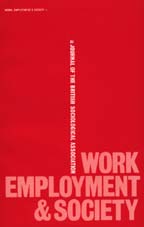Crossref Citations
This article has been cited by the following publications. This list is generated based on data provided by
Crossref.
Diewald, Martin
2002.
Sozialer Wandel und gesellschaftliche Dauerbeobachtung.
p.
131.
Rosenfeld, Rachel A.
Trappe, Heike
and
Gornick, Janet C.
2004.
Gender and Work in Germany: Before and After Reunification.
Annual Review of Sociology,
Vol. 30,
Issue. 1,
p.
103.
Barabasch, Antje
and
Lakes, Richard D.
2005.
School-to-Work Transition in East Germany: Challenges of a Market Society.
Career and Technical Education Research,
Vol. 30,
Issue. 1,
p.
3.
Trappe, Heike
and
Sørensen, Annemette
2006.
ECONOMIC RELATIONS BETWEEN WOMEN AND THEIR PARTNERS: AN EAST AND WEST GERMAN COMPARISON AFTER REUNIFICATION.
Feminist Economics,
Vol. 12,
Issue. 4,
p.
643.
Trappe, Heike
2006.
Berufliche segregation im kontext.
KZfSS Kölner Zeitschrift für Soziologie und Sozialpsychologie,
Vol. 58,
Issue. 1,
p.
50.
Diewald, Martin
2007.
Agency or constraint? The mutual shaping of control beliefs and working lives in East Germany after 1989.
International Journal of Psychology,
Vol. 42,
Issue. 2,
p.
77.
Tomasik, Martin J.
and
Silbereisen, Rainer K.
2009.
Demands of Social Change as a Function of the Political Context, Institutional Filters, and Psychosocial Resources.
Social Indicators Research,
Vol. 94,
Issue. 1,
p.
13.
Mano, Rita S.
2011.
Individual and Organizational Determinants of Wage Disparities in Israel's Local Authorities.
Sociological Focus,
Vol. 44,
Issue. 4,
p.
339.
Haupt, Andreas
2012.
(Un)Gleichheit durch soziale Schließung.
KZfSS Kölner Zeitschrift für Soziologie und Sozialpsychologie,
Vol. 64,
Issue. 4,
p.
729.
Pavlin and Ivan Svetlik, Samo
and
Robert, Peter
2014.
Job mismatch in early career of graduates under post-communism.
International Journal of Manpower,
Vol. 35,
Issue. 4,
p.
500.
Infurna, Frank J.
Gerstorf, Denis
Ram, Nilam
Schupp, Jürgen
Wagner, Gert G.
and
Heckhausen, Jutta
2016.
Maintaining perceived control with unemployment facilitates future adjustment.
Journal of Vocational Behavior,
Vol. 93,
Issue. ,
p.
103.
Chen, Yunsong
and
Volker, Beate
2016.
Social capital and homophily both matter for labor market outcomes – evidence from replication and extension.
Social Networks,
Vol. 45,
Issue. ,
p.
18.
Reichelt, Malte
and
Abraham, Martin
2017.
Occupational and Regional Mobility as Substitutes: A New Approach to Understanding Job Changes and Wage Inequality.
Social Forces,
Vol. 95,
Issue. 4,
p.
1399.
Silbereisen, Rainer K.
2018.
Diversity in Harmony – Insights from Psychology.
p.
415.
Studer, Matthias
Struffolino, Emanuela
and
Fasang, Anette E.
2018.
Estimating the Relationship between Time-varying Covariates and Trajectories: The Sequence Analysis Multistate Model Procedure.
Sociological Methodology,
Vol. 48,
Issue. 1,
p.
103.
Nennstiel, Richard
2021.
On the way to becoming a society of downward mobility? Intergenerational occupational mobility in seven West German birth cohorts (1944–1978).
Research in Social Stratification and Mobility,
Vol. 73,
Issue. ,
p.
100609.
Chen, Yunsong
2022.
Causal Effects of Social Capital.
p.
103.




